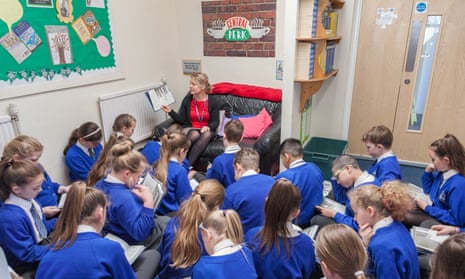Experts have called on the government to make story time an intrinsic part of the school day for children right up to their teens, after two major new pieces of research revealed a decline in both the number of children being read to daily and the number reading for pleasure by themselves.
The findings of Nielsen Book Research’s annual survey into the reading habits of British children, to be revealed on Tuesday at an industry conference, show that only 32% of British children under 13 are read to daily by an adult, for pleasure, down four percentage points on the previous year, and nine percentage points down on 2012.
Most parents stop reading to their child by the age of eight, with just 19% of eight to 10-year-olds read to daily by an adult, across all socio-economic groups, down 3% on last year. Boys were less likely to be read to daily than girls at 14%, compared with 24%.
A second major survey of 27,000 children and young people, carried out by the National Literacy Trust ahead of World Book Day on Thursday, found that the number of eight to 18-year-olds reading for pleasure has now dropped to 52.5%, from 58.8% in 2016, with only a quarter (25.7%) reading daily, compared with 43% in 2015. The majority of boys and over half of girls in every age group said they preferred screentime to reading.
Publisher Egmont, which co-funded the Nielsen research, said that the steep decline in parents reading to them “signals a significant threat to children’s wellbeing, with potential longer-term social impact”. It highlighted a strong correlation between older children being read to, and children choosing to read independently for pleasure; 74% of eight to 13-year-olds who were read to each day also read independently, compared with just 29% of those who were read to less than once a week.
Experts say reading aloud to children, free from accompanying work or exercises, is key to fostering reading for pleasure. A 2018 National Literacy Trust study found that children who enjoyed reading were significantly less likely to have mental health problems, while the Centre for Longitudinal Studies found in 2013 that reading for pleasure has a four times greater impact on academic success than one parent having a degree.

Egmont’s consumer insight director and author Alison David called on the government to make space for reading in the school curriculum, stressing that a daily story time “should be an intrinsic part of the school day, as normal, unquestionable and as unchangeable as lunch break”. Ideally, she said, this should run into their teens.
“The Department for Education states that nothing is more important than ensuring every child can read well, and the way to do this is to instil a passion for reading for pleasure. This won’t be achieved by guided reading lessons and tests. Space must be made in the school day for story time,” said David. “Teachers are vastly overburdened by the curriculum and unless time is made for story, then it won’t happen for all children every day, which it needs to – for our children’s futures.”
Former children’s laureate and War Horse author Michael Morpurgo backed the call. “It is vital that children, young people and all of us have access to stories which give us the knowledge, empathy and understanding we need to negotiate life. But just as importantly, we need to give children and their teachers and parents time to read.”
Egmont worked with St Joseph’s Catholic Academy in Stoke-on-Trent in 2018 to trial daily teacher-led story-time sessions over a five-month period. It said that teachers found a dramatic improvement in reading skills, with children’s reading comprehension ages increasing by 10 months on average – twice what was expected.
“It is no secret that the primary curriculum is jam-packed and some days it was a struggle to fit in story time, but the benefits were clearly evident,” said headteacher Laura Hamilton.
As millions of £1 book tokens are sent to children across the UK and Ireland in celebration of World Book Day, and the Share a Story Live tour brings authors and illustrators to areas affected by lower levels of literacy, World Book Day organisers stressed the difference that sharing a story with a child can make to their future.
“Whether your children are dressed up today or not, sit down with them for 10 minutes on World Book Day, and every day – and share a story,” said director Kirsten Grant. “We all know how important it is to our children’s health to give them their ‘five a day’. It’s just as important for their wellbeing to read with them for 10 a day.”
